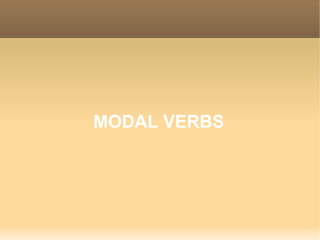Modal verbs (2)
•Als ODP, PDF herunterladen•
1 gefällt mir•27,869 views
Melden
Teilen
Melden
Teilen

Empfohlen
Weitere ähnliche Inhalte
Was ist angesagt?
Was ist angesagt? (20)
Modal verbs-must/have to- should/ought to-may/might/must/can have p.p. verb 

Modal verbs-must/have to- should/ought to-may/might/must/can have p.p. verb
Andere mochten auch (20)
Language for Advice and Suggestions - why don't you.../ have you tried.../ yo...

Language for Advice and Suggestions - why don't you.../ have you tried.../ yo...
Ähnlich wie Modal verbs (2)
Ähnlich wie Modal verbs (2) (20)
Verbos modales Liane Ninelly Jara Pèrez Escuela Normal Superior de Acacias

Verbos modales Liane Ninelly Jara Pèrez Escuela Normal Superior de Acacias
Mehr von MarisolFlorez
Mehr von MarisolFlorez (6)
Kürzlich hochgeladen
Programación Anual D.P.C.C 1ro1ro Programación Anual D.P.C.C planificación anual del área para el desarroll...

1ro Programación Anual D.P.C.C planificación anual del área para el desarroll...JoseMartinMalpartida1
Kürzlich hochgeladen (20)
Tema 19. Inmunología y el sistema inmunitario 2024

Tema 19. Inmunología y el sistema inmunitario 2024
1ro Programación Anual D.P.C.C planificación anual del área para el desarroll...

1ro Programación Anual D.P.C.C planificación anual del área para el desarroll...
Tema 10. Dinámica y funciones de la Atmosfera 2024

Tema 10. Dinámica y funciones de la Atmosfera 2024
PINTURA DEL RENACIMIENTO EN ESPAÑA (SIGLO XVI).ppt

PINTURA DEL RENACIMIENTO EN ESPAÑA (SIGLO XVI).ppt
BIOMETANO SÍ, PERO NO ASÍ. LA NUEVA BURBUJA ENERGÉTICA

BIOMETANO SÍ, PERO NO ASÍ. LA NUEVA BURBUJA ENERGÉTICA
ACRÓNIMO DE PARÍS PARA SU OLIMPIADA 2024. Por JAVIER SOLIS NOYOLA

ACRÓNIMO DE PARÍS PARA SU OLIMPIADA 2024. Por JAVIER SOLIS NOYOLA
Prueba libre de Geografía para obtención título Bachillerato - 2024

Prueba libre de Geografía para obtención título Bachillerato - 2024
Louis Jean François Lagrenée. Erotismo y sensualidad. El erotismo en la Hist...

Louis Jean François Lagrenée. Erotismo y sensualidad. El erotismo en la Hist...
Novena de Pentecostés con textos de san Juan Eudes

Novena de Pentecostés con textos de san Juan Eudes
La Sostenibilidad Corporativa. Administración Ambiental

La Sostenibilidad Corporativa. Administración Ambiental
Concepto y definición de tipos de Datos Abstractos en c++.pptx

Concepto y definición de tipos de Datos Abstractos en c++.pptx
Los avatares para el juego dramático en entornos virtuales

Los avatares para el juego dramático en entornos virtuales
Modal verbs (2)
- 1. MODAL VERBS
- 2. CARACTERÍSTICAS GENERALES - Son verbos defectivos (tienen defectos). - Son invariables; tienen la misma forma para todas las personas. - No necesitan del verbo auxiliar do para hacer la negativa e interrogativa. - Siempre van seguidos de un verbo en infinitivo - Be able to y have to no cumplen todas estas características pero sí algunos de sus usos (habilidad, obligación). Estas dos formas verbales suplen las formas de las que carecen can y must.
- 4. CAN, CAN'T, COULD, BE ABLE TO
- 5. CAN AFIRMATIVA - Habilidad : My sister can speak Russian. - Dar permiso: You can go to the toilet. - Posibilidad: Parkour can be dangerous.
- 6. CAN'T - Falta de habilidad : I can't speak Japanese. - Certeza de que algo es imposible: It isn't very late. The pub can't be closed.
- 7. CAN? - Pedir permiso para hacer algo. Can I go to the toilet?
- 8. COULD AFIRMATIVA - Habilidad en el pasado. He could run marathons when he was younger. - Sugerencias en tono educado. Your cousin could take a taxi to the station. - Posibilidad (más remota que con can) It could be useful to learn about other cultures.
- 9. COULD? - Peticiones educadas. Could you help me with the homework?
- 10. BE ABLE TO (SER CAPAZ DE) - Sirve para suplir los tiempos que le faltan a can/ could. In ten years, she will be able to speak English. http://www.englisch-hilfen.de/en/exercises/modals/can
- 11. MUST, HAVE TO
- 12. MUST - Obligación : We must be quiet in class. Con must la obligación es más fuerte que con have to (como cuando la impone la ley o alguien de autoridad) - Deducción, certeza de que algo es verdad. He must be 40 years old. Sólo se puede usar en presente. El resto de los tiempos se forma con have to.
- 13. MUSTN'T - Prohibición : You mustn't exceed the speed limit.
- 14. HAVE TO - Obligación, necesidad (menos fuerte que con must). You have to study if you want to pass. - No es un verbo modal por lo que necesita el auxiliar para formar la negativa e interrogativa. He doesn't have to bring the books. Do you have to get up early on Sundays?
- 15. NEED TO EXPRESA NECESIDAD YOU NEED TO STUDY HARDER
- 16. NEEDN'T TO FALTA DE OBLIGACIÓN, NECESIDAD YOU NEEDN'T BRING ANYTHING- THERE IS LOTS OF FOOD.
- 17. SHOULD/ OUGHT TO INDICAN CONSEJO MY FRIEND OUGHT TO IMPROVE HIS MANNERS. YOU SHOULD STUDY HARDER IF YOU WANT TO PASS.
- 18. MAY/ MIGHT EXPRESAN POSIBILIDAD. EN ESPAÑOL SE TRADUCEN COMO PUEDE QUE MIGHT INDICA UNA POSIBILIDAD MÁS REMOTA QUE MAY IT MAY RAIN TOMORROW/ IT MIGHT SNOW TOMORROW MAY EN INTERROGATIVA SEUSA PARA HACER PETICIONES EDUCADAS. MAY I COME IN?
- 19. WOULD SE USA PARA HACER PETICIONES FORMALES Y OFRECIMIENTOS. WOULD YOU OPEN THE WINDOW, PLEASE? WOULD YOU LIKE SOMETHING TO DRINK?
- 20. ACTIVIDADES ON-LINE http://a4esl.org/q/h/0101/ig-modals.html http://www.englishexercises.org/makeagame/viewg http://www.englishexercises.org/makeagame/vi ewgame.asp?id=1793
- 22. COULD HAVE+ PARTICIPIO PASADO EXPRESA HABILIDAD PARA HABER HECHO ALGO EN EL PASADO PERO NO SE HIZO. IT WAS A STUPID THING TO DO. YOU COULD HAVE HURT YOURSELF PARTICIPIO DE PASADO
- 23. COULDN'T HAVE +PARTICIPIO DE PASADO CERTEZA DE QUE ALGO NO SUCEDIÓ EN EL PASADO ERIK COULDN'T HAVE BROKEN THE VASE (JARRÓN). HE WASN'T AT HOME
- 24. MAY/ MIGHT HAVE+ PARTICIPIO DE PASADO EXPRESA UNA CONJETURA (¿PASÓ O NO PASÓ?) SOBRE UNA ACCIÓN PASADA. SHE MAY/MIGHT HAVE TAKEN THE WRONG BUS.
- 25. MUST HAVE + PARTICIPIO DE PASADO INDICA UNA CERTEZA O UNA CONCLUSIÓN LÓGICA SOBRE UN HECHO DEL PASADO I HEAR YOU'VE BEEN TO SCOTLAND. THAT MUST HAVE BEEN INTERESTING.
